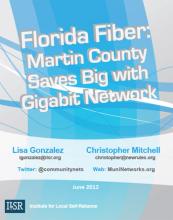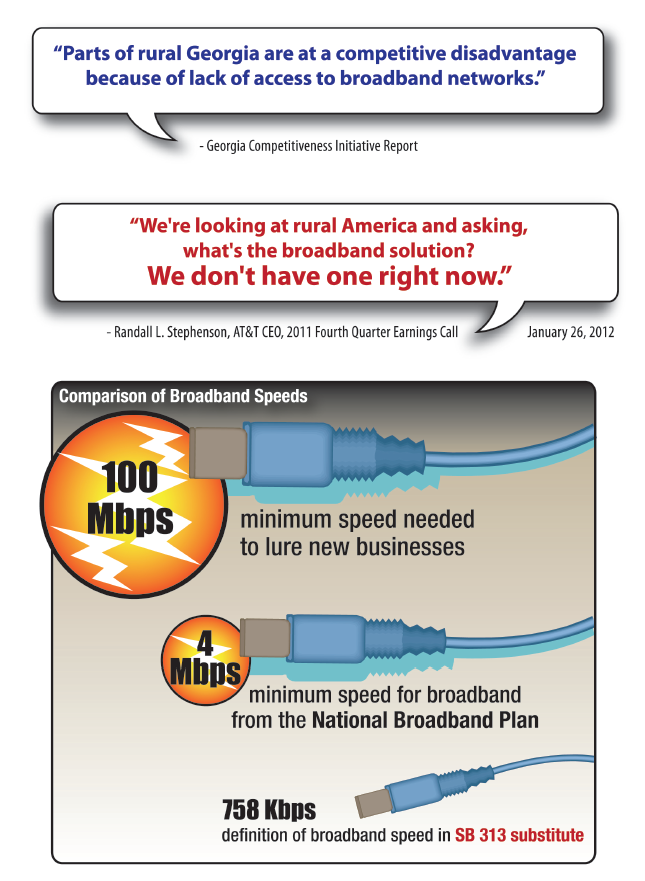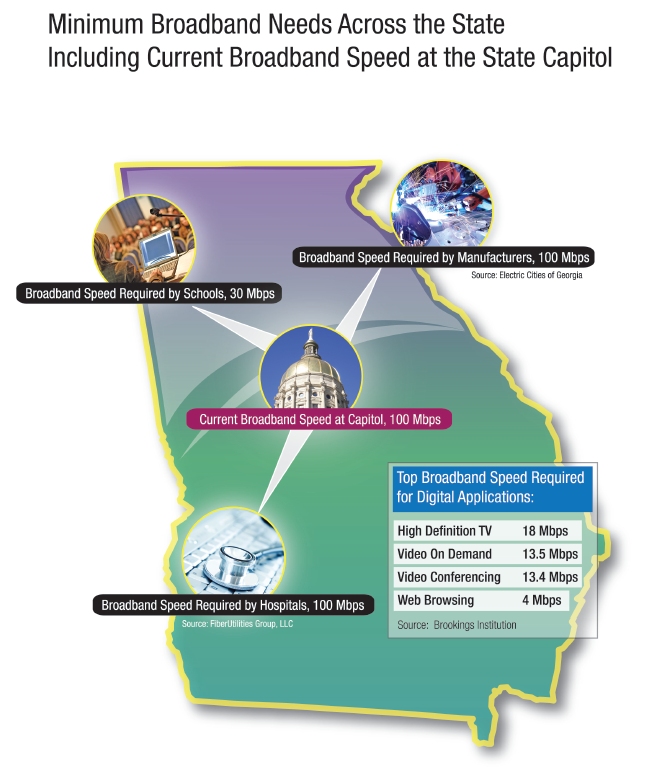
Fast, affordable Internet access for all.

In June, the city council of Greenacres, Florida, voted to invest $42,550 to connect to Palm Beach County's fiber-optic network. Greenacres joins a growing list of Palm Beach County municipalities who have data-transmission agreements with the County. Other towns include Palm Beach Gardens, Jupiter, Juno Beach, West Palm Beach, Delray Beach and Riviera Beach.
Willie Howard of the Palm Beach Post covered the Greenacres story earlier this month:
Instead of paying AT&T and Comcast $33,360 annually for transmission lines, the city will pay Palm Beach County $8,400 annually.
"It's basically cost sharing as opposed to revenue generating," said Mike Butler, director of network services for Palm Beach County. "We're not in it to make money."
Thomas Hughes, Finance Director of Greenacres, estimates the savings to the City will amount to $124,800 over five years.
In addition to saving money, Greenacres will have the advantage of increased speed. Currently, AT&T and Comcast provide a 1.5 Mbps connections. The new arrangement will provide 10 Mbps from the County - six times faster at a little more than one third the cost. The City can also feel good about keeping the dollars local and will avoid the uncertainty in dealing with remote and giant AT&T or Comcast.
Palm Beach County sits just south of Martin County, where a municipal network saves the County and school district significant dollars for connectivity. You can download our recent case study on Martin County, Florida Fiber: How Martin County Saves Big with Gigabit Network, to learn more about that network.

AT&T and Verizon, the dominant telephone companies, want to end their 99-year-old universal service obligation known as "provider of last resort." They say universal landline service is a costly and unfair anachronism that is no longer justified because of a competitive market for voice services. The new rules AT&T and Verizon drafted would enhance profits by letting them serve only the customers they want. Their focus, and that of smaller phone companies that have the same universal service obligation, is on well-populated areas where people can afford profitable packages that combine telephone, Internet and cable television.What happens when the states hand over authority to these companies? David has an answer:
AT&T and Verizon also want to end state authority to resolve customer complaints, saying the market will punish bad behavior. Tell that to Stefanie Brand. Brand is New Jersey's ratepayer advocate whose experience trying to get another kind of service - FiOS - demonstrates what happens when market forces are left to punish behavior, she said. Residents of her apartment building wanted to get wired for the fiber optic service (FiOS) in 2008. Residents said, "We want to see your plans before you start drilling holes, and Verizon said, 'We will drill where we want or else, so we're walking,' and they did," Brand told me. Verizon confirmed that because of the disagreement Brand's building is not wired. And there's nothing Brand can do about it. Verizon reminded me the state Board of Public Utilities no longer has authority to resolve complaints over FiOS.Better broadband is not just about technology.
Wise people say that collaboration often leads to a better result than individual efforts. Recently, I was reminded of the benefits of different levels of collaboration, as they relate to community networks, in two separate articles about fiber-optic expansion in Wisconsin.
First, is a recent Randy Happel article in Trenchless Technology, about how UW-Extension is working with a private telecommunications network design, engineering, and construction firm to expand the fiber-optic landscape in their state. Over thirty-seven million dollars in stimulus funding for UW-Extension through the American Recovery and Reinvestment Act (ARRA) is allocted as part of the Broadband Technology Opportunities Program (BTOP). The result will be a 630-mile fiber-optic network to help improve connectivity in Wisconsin.
CCI Systems, the private partner, has been around since 1955 and has a history in CATV networks. From the Happel article:
“Public-private partnerships are our expertise,” says Dave Mattia, director of operations for CCI Systems. “We are also quite adept at working within the parameters for the federal funding programs. Our experience and expertise in designing and building broadband, fiber-optic communications networks are great assets to our partners.”
“Our approach is extremely disciplined and methodical,” says Cory Heigl, director of business development for CCI Systems. “Collaboration, listening and cooperation are critical to maximize project efficiencies. Other firms may start by choosing a technology. We begin by listening and identifying the desired end result. Our approach streamlines the process and has proven most effective in securing funding, especially grants and stimulus money.”
After fiber installation is complete, scheduled for June 2013, CCI Systems will shift from installation and design to maintenance and support. After the long battle with AT&T, working with a cooperative partner like CCI Systems must be a welcome relief for UW-Extension.
According to a report by the National Institute on Money in State Politics, Dialing Up the Dollars: Telecommunication Interests Donated Heavily to NC Lawmakers, Republican lawmakers and those who held key leadership positions, sponsored the bill, and/or who voted in favor of the bill received considerably more campaign contributions from the telecommunication donors than did their colleagues. For example, lawmakers who voted in favor of HB 129 received on average 76 percent more than the average received by those who voted against the bill. The four primary sponsors of the bill received an average of $9,438 each, more than double the $3,658 given on average to lawmakers who did not sponsor the bill.Recall that Time Warner Cable pushed this bill for years with some help from AT&T, CenturyLink, and others that stood to benefit by limiting broadband competition. But the Legislature wisely refused to enact it... until 2011. Now we have a better sense of what may have shifted the balance. Consider this:
Thom Tillis, who became speaker of the house in 2011, received $37,000 in 2010–2011 (despite running unopposed in 2010), which is more than any other lawmaker and significantly more than the $4,250 he received 2006–2008 combined. AT&T, Time Warner Cable, and Verizon each gave Tillis $1,000 in early-mid January, just before he was sworn in as speaker on January 26. Tillis voted for the bill, and was in a key position to ensure it moved along the legislative pipeline.Running unopposed for office, he collected more money from the cable and phone companies than any other Representative and almost 10 times as much as in the previous two cycle combined. As Speaker, he set the agenda and decided priorities.
 Note, that AT&T was originally trying to define broadband at the absurd 200kbps level but a substitute bill would have bumped it up to a still-too-low 768kbps, which is referenced above.
The other flyer that apparently made a difference with legislators is here:
Note, that AT&T was originally trying to define broadband at the absurd 200kbps level but a substitute bill would have bumped it up to a still-too-low 768kbps, which is referenced above.
The other flyer that apparently made a difference with legislators is here:
 Rememeber that elected officials often think of broadband in binary terms. You have it or you don't. In their mind, if you have options aside from dial-up, the problem is solved. These are people that often do not know what is needed to attract economic development, work efficiently from home, or successfully compete remote education courses.
Graphics that explain why we need next-generation networks rather than simply expanding last-century DSL can be remarkably helpful.
Rememeber that elected officials often think of broadband in binary terms. You have it or you don't. In their mind, if you have options aside from dial-up, the problem is solved. These are people that often do not know what is needed to attract economic development, work efficiently from home, or successfully compete remote education courses.
Graphics that explain why we need next-generation networks rather than simply expanding last-century DSL can be remarkably helpful.The SEC has moved network neutrality from the murky back rooms of day-to-day operations into the bright light of of shareholder resolutions.
This is a significant turn for the SEC and it opens up a new avenue in the campaign for net neutrality. As the SEC helpfully reminds us, “One of the key rights of shareholders is the right to vote their shares on important matters that affect the companies they own.” The SEC gives companies a fair amount of discretion on resolutions. In previous years, the SEC’s Division of Corporation Finance ruled that similar net neutrality proposals pertained to “ordinary business” and could be excluded from shareholder ballots.
The telcos have reason to be afraid. Proxy fights have derailed business plans and taken down CEOs. Most successful campaigns have been carried out by activist fund managers with substantial stakes in relatively small companies (by stock exchange standards).
The Benedictine Sisters of Mount St. Scholastica, the Nathan Cummings Foundation, and Trillium Asset Management have led the effort to put this on shareholder ballots. They will need help to move it forward. Proposals must claim a minimum percentage of support in order to be allowed on the ballot next year.
This time of year about 20 percent of U.S. households receive proxy voting forms, and most are promptly discarded. If you ask your parents and grandparents, chances are good someone owned some shares of Ma Bell at one time and now has voting rights in a telco.
If your only investments are in mutual funds, you can still make your voice heard. Contact the fund management company, tell them you support net neutrality, and ask them how they are planning to vote on the issue.